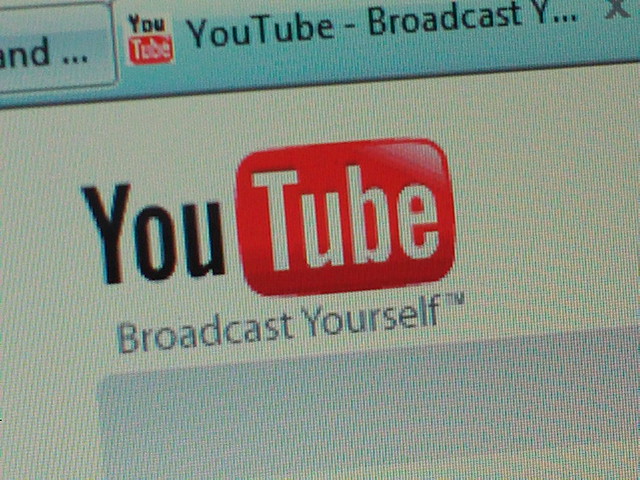YouTube Couldn’t Care Less About Hate Speech
As long as the platform sticks to its current business model, it will continue to elevate right-wing reactionaries like Steven Crowder. Andrew Perry / Flickr
Andrew Perry / Flickr
Another day, another internal debate at YouTube about whether it will enforce its own content policies. And yet again, YouTube’s decision seems to solidify that the video platform will continue to be a welcoming home for channels that promote hate speech and harassment, and serve as a conduit for laundering far-right ideology—as long as those channels continue to make YouTube money.
Carlos Maza, host of the Vox online video show Strikethrough, published a tweet thread on June 4 detailing the online harassment he has received as a result of a campaign against him by right-wing pundit and comedian Steven Crowder. Crowder has repeatedly used anti-gay rhetoric to attack Maza, calling him a “lispy queer,” an “angry little queer” and “Mr. Gay Vox,” among other insults. He frequently refers to Maza’s ethnicity, calling him a “gay Mexican” or a “gay Latino from Vox.”
Since I started working at Vox, Steven Crowder has been making video after video “debunking” Strikethrough. Every single video has included repeated, overt attacks on my sexual orientation and ethnicity. Here’s a sample: pic.twitter.com/UReCcQ2Elj
— Carlos Maza (@gaywonk) May 31, 2019
Crowder, a former Fox News contributor, is perhaps best known for his “change my mind” meme, where he attempts to debate college students over issues like how many genders there are. His YouTube show centers around rants, pranks and sketches designed to shock or “trigger” the usual targets of right-wing anger, like feminists, gays, immigrants and “social justice warriors.” Crowder has a history of using racial slurs in his comedy, and also sells T-shirts on his YouTube page and website that declare “Socialism Is for F*gs.” (He coyly maintains that the word in question is “figs.”)
Multiple studies of YouTube’s algorithm have placed Crowder firmly within the same crowd of conspiracy theorists, white supremacists and outright Nazis on the website, all of whom network with one another through interviews and promotion, exploiting the algorithm and autoplay functions built into the website in order to increase their views and subscriptions.
While Crowder might not be as extreme as some of his contemporaries, the so-called Intellectual Dark Web and the far-right anti-SJW cadre aren’t some small subculture tucked away deep in the Internet’s basement; they are massively popular and major money makers for YouTube, whose business model is based around selling advertisements. Crowder alone has almost 4 million subscribers, and many of his videos amass tens of millions of views.
In response to Maza’s thread, YouTube reviewed Crowder’s statements in his videos and “found language that was clearly hurtful.” However, the company maintained that Crowder’s videos did not violate their website’s content policy. Never mind that the torrent of hate Maza has documented from both Crowder and his millions of fans violates YouTube’s rules against harassment. Crowder’s videos targeting Maza’s sexual orientation and ethnicity clearly violate the platform’s rules against hateful content as well.
According to Gizmodo (6/5/19), who reached out to YouTube parent company Google, the website maintains that it focused on whether the videos were centered “primarily on debating the opinions expressed,” or whether the videos were “solely malicious”—as though slurs embedded in a coherent far-right ideology are preferable to ones uttered at random.
Obsession with “debate” is a constant fixture of the online right. Crowder and contemporaries like Ben Shapiro relish in constantly calling for debates with their ideological opponents, using debate as a mask for their own interest in trolling, harassing and employing slurs against their targets. When their opponents refuse these clearly bad-faith challenges, the right decry the left’s supposed lack of “logic,” “reason” and “rationality.” (Strikingly, when these right-wingers actually do get challenged to real debates, they either refuse or embarrass themselves; when they aren’t arguing with 18-year-old college freshmen, they don’t tend to do so well.)
According to Maza, when he was doxxed last year, he was greeted with an endless stream of texts calling for him to “debate” Crowder. But because Crowder didn’t explicitly instruct his followers to harass or doxx Maza, YouTube decided that Crowder was not in violation. As Maza noted to Vox (6/5/19), “a policy that says that all you need to do to get away with hate speech on the platform is to mix it with something else is an instruction manual to monsters who want to figure out a way to target people based on identity.”
YouTube’s refusal to seriously address Maza’s complaints exposes the platform’s avowed support for the LGBT community as nothing but hollow branding. Like many companies, YouTube and Google have heavily integrated Pride Month and LGBT themes as marketing tools. YouTube’s own spotlight homepage currently displays the company logo in rainbow colors, with the backing of a LGBT mural. All of YouTube’s other official social media accounts use the same branding. The top promotion on the YouTube spotlight homepage is a playlist celebrating Pride. The company also created a Pride documentary commemorating gay liberation struggles, and plans to release two more during the month.
There is clearly a fundamental disconnect between the inclusive PR-shaped image that YouTube seeks to promote, and the tolerance for homophobia of its actual content policies in practice. Here is a member of the LGBT community clearly being harassed based on their sexual orientation and race, while the supposedly progressive platform for the harassment throws up its hands, saying that there’s nothing it can do. This sort of “pinkwashing” is the norm within companies that profess to support LGBT rights. However, YouTube’s hypocrisy is much more visible, considering the leeway they give creators who are hostile to the LGBT communities, immigrants and people of color generally.
YouTube’s business model is about empowering creators who attract eyeballs, no matter what content those creators publish. It’s why it took them years to kick the massively popular conspiracy theorist Alex Jones off the platform. And it’s why YouTube has long been a conduit for conspiracy theories, far-right reactionary ideology, white supremacy and Nazism.
Following a day’s worth of online backlash to their handling of the Maza/Crowder affair, YouTube declared that it would “demonetize” Crowder’s channel, a sanction that it has previously imposed on numerous LGBT channels. (“I’ve done multiple tests in proving that the word ‘transgender’ on my channels has demonetized my videos,” trans YouTuber Chase Ross complains—The Verge, 6/4/18.) However, this decision amounts to a mere slap on the wrist: All of Crowder’s videos remain up, they just won’t get promoted, or make money through YouTube’s AdSense network, until he removes links to his web store that sells the “Socialism is for F*gs” t-shirts. Crowder appears to have met these incredibly lax terms, but followed up by publishing a half-hearted apology video where he maintained that he is not in violation of YouTube’s content policy, and continued to promote his T-shirts—via his website rather than YouTube. In response to the affair, Crowder’s followers have since took to selling T-shirts declaring “Carlos Maza is a F*g.”
Along with Crowder’s demonetization, YouTube announced that it was finally banning content that promotes white supremacy. However, YouTube did not specify which white supremacist accounts had been banned. At first glance, numerous white supremacist accounts, such as Red Ice, American Renaissance and Identity Evropa, along with Charlottesville marchers James Allsup and Nick Fuentes, are still active on the platform. While some of these channels have been demonetized, their continued existence on the site signal that YouTube is ultimately OK with keeping this sort of content on their site. It wouldn’t be a stretch to assume that most of the accounts that were actually banned were smaller channels with mere handfuls of subscribers.
As an addendum to the white supremacist bans, YouTube’s Chris Dale put out a blog post saying that the platform would take a look at its content policies, and potentially update policies on harassment and hateful content. However, Dale said he was reluctant to ban speech that YouTube considered to be “borderline,” noting that if YouTube “were to take all potentially offensive content down, we’d be losing valuable speech.” “Valuable,” apparently, being the operative word here.
YouTube is not taking a free speech absolutist position, yet it still accords users the right to stir up hatred against a “lispy,” “angry little queer” among millions of followers. Regardless of what YouTube chooses to do about its content management in the future, the white supremacist ban and Crowder’s demonetization have given fuel to the right’s constant paranoid refrain that social media sites like YouTube and Facebook are biased against them.
Crowder, along with scores of other right wingers like Tim Pool and Dave Rubin (who misleadingly labels himself a “classical liberal”), would post videos lamenting “censorship” and a “crackdown” against free speech by YouTube. Popular commentators like Joe Rogan, whose show has hosted numerous members of the alt-right and the Dark Web, equated Crowder’s homophobic content to videos of left-wing figures debunking right-wing videos. As a guest on Tucker Carlson’s Fox News show (2/6/19), free speech advocate and Intercept editor Glenn Greenwald confoundingly called Maza “powerful” and Crowder “marginalized.”
In the midst of Crowder’s demonetization and the bans of racist extremists, YouTube, likely on accident, demonetized or banned a number of channels that were not white supremacists or Nazis, but actually ones that document them. These casualties include News2Share‘s Ford Fischer, who extracts clips from the far right to document extremism, and filmmaker and history teacher Mr. Allsop, who uses World War II–era Nazi footage as a teaching tool.
Following the unintended demonetization of Fischer, Allsop and others, the right instantly seized on YouTube’s mistakes, circulating the hashtag #VoxAdpocolypse and accusing Maza of leading a coordinated campaign to silence journalists, citing his support for deplatforming Nazis and throwing milkshakes at members of the far right. Commenters on 4Chan continued to spread blatant lies about Maza, while others dug through his tweets for potentially damning comments, taking many out of context.
There will always be issues with giving multi-billion-dollar tech companies like Google the power and responsibility of policing online discourse, especially when deplatforming tactics intended for the far right are frequently turned against the left. But YouTube, as a private company, has terms of service that clearly bar harassment and the promotion of hatred based on sexual orientation, ethnicity and other identities—yet it allows homophobic slurs to be continually directed against an individual, so long as that target’s ideas are ridiculed along with his identity.
Clearly, YouTube’s content regulation policy is in practice arbitrary, or at the very least not enforceable to the standards that they currently publish on their website. Under this system, whichever way YouTube decides to enforce its content policy on any given day will always piss someone off. More often than not, however, YouTube sides with the creators who drive the most views and engagement, and thus make it the most money. Right now, the platform is too afraid to upset their money-making machine—that is, the content mill of far-right reactionary ideology that brings in tens of millions of views.
As Maza himself said, Crowder isn’t necessarily the problem. There will always be homophobes, racists and bigots in the world. But YouTube gives them an outsized voice and the ability to reach millions of followers, not just by hosting the videos but by steering audiences to them via its system of recommendations.
As long as YouTube continues to adhere to an advertising-based business model that rewards harassment and hate in its recommendation algorithms, high earning bullies like Crowder shouldn’t have much to fear. The same can’t be said about vulnerable members of the LGBT community that YouTube supposedly cares about.
Your support matters…Independent journalism is under threat and overshadowed by heavily funded mainstream media.
You can help level the playing field. Become a member.
Your tax-deductible contribution keeps us digging beneath the headlines to give you thought-provoking, investigative reporting and analysis that unearths what's really happening- without compromise.
Give today to support our courageous, independent journalists.




You need to be a supporter to comment.
There are currently no responses to this article.
Be the first to respond.